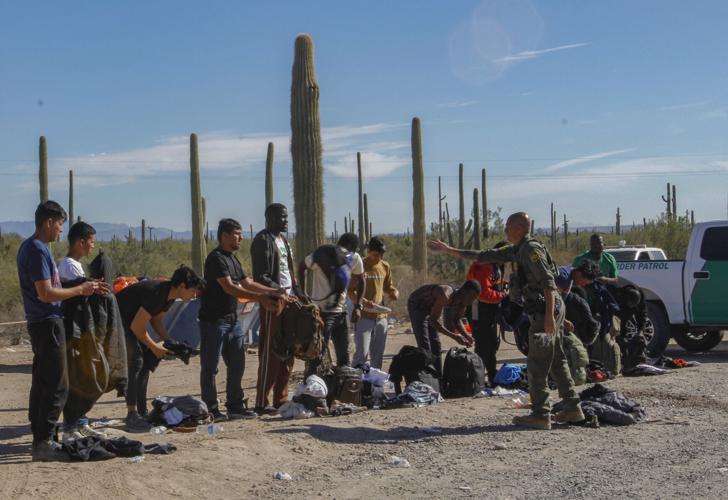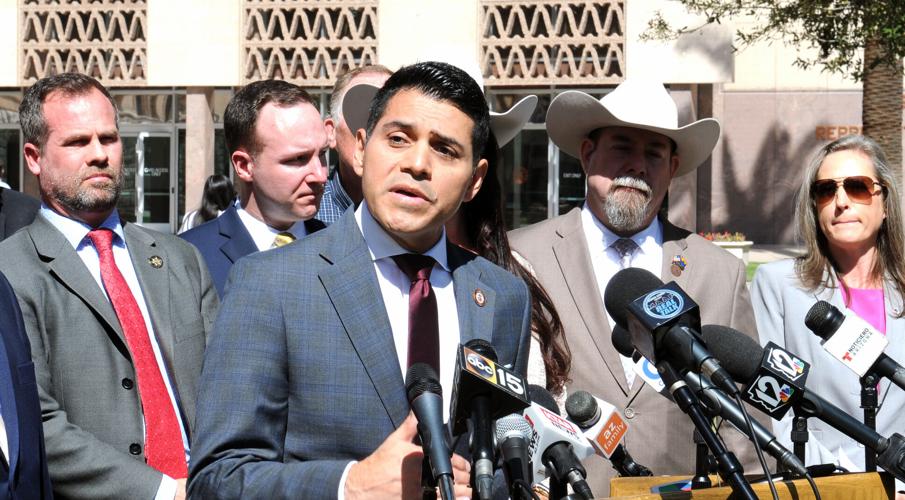PHOENIX — Refusing to take “no” for an answer, Republican legislators are going to resend the same border law enforcement bill back to Gov. Katie Hobbs that she vetoed just a week ago.
“It is unacceptable that our own governor won’t give Arizona a fighting chance at the border,’’ said Rep. Steve Montenegro, R-Goodyear. He is the sponsor of HB 2821, a carbon-copy of the measure that Hobbs rejected.
That measure to allow state and local police to arrest people who crossed the border illegally remains alive — and can be sent back to the governor.
And Senate President Warren Petersen brushed aside questions of whether Republicans just sending back the same language that Hobbs said in a veto message she found unacceptable and hoping for a different outcome fits the definition of insanity.
“It would be absolutely insane for her to veto the bill again,” said the Gilbert Republican.
Anyway, he said, sometimes governors do sign measures they have previously rejected. He said that’s already in the cards for the “tamale bill” that Hobbs vetoed last year to expand the kinds of items that can be prepared in home kitchens and sold to the public.
What Petersen did not say is that the version of that which will be going to the governor this year is different than the one she vetoed.
“She should sign it,” he said of the border measure.
And if nothing else, the Senate president suggested that the ultimate fate of a resurrected measure depends on news coverage.
“If the media would have the right narrative with her and was pointing out the truth, and will point out the truth, I’m confident she’ll sign it,” Petersen said.
But gubernatorial press aide Christian Slater said he shouldn’t hold his breath. Asked for a comment about the plan to resend the measure to his boss, Slater sent back a statement of opposition Hobbs issued in February, even before her actual veto detailing why she opposed the bill.
There is a work-around: Lawmakers could bypass Hobbs and sent the issue directly to voters.
“We may,” said Petersen. In fact, that’s the path GOP leaders already are taking with HCR 2060 which would add teeth to existing laws that require employers to use the federal E-Verify program to determine whether the people they hire are in this country legally. That measure also would extend that requirement to use E-Verify when someone applies to certain public benefits.
Even Hobbs has acknowledged that proposals on the November ballot to deal with border issues could gain significant support.
“I certainly understand that voters are frustrated and want to see something resolve this,” she said.
Monday’s news conference was not just about a do-over for the bill on empowering state and local police. GOP lawmakers also detailed other measure they said would help deal with border crossers and the related problems of smuggling humans and drugs.
These include:
SCR 1021 providing for life imprisonment, without possibility of parole, for any adult who is convicted of child sex trafficking;
SB 1344 saying it is first degree murder if someone dies as a result of fentanyl trafficking;
SB 1608 to make it a felony to use a telephone or computer app or program to knowingly assist in human smuggling;
HB 2374 creating a Class 2 felony to flee law enforcement in a vehicle if it intentionally, knowingly or recklessly causes death or serious physical injury;
SCR 1042 expressing support for Texas in its fight with the federal government over who has the right to secure the border.
It is that last issue that is at the heart of the measure Hobbs vetoed, as the bill is a virtual carbon-copy of the Texas law.
The proposal would make it a state crime for anyone who is an “alien” to enter the United States from any foreign nation other than at a port of entry. More to the point, it would authorize state or local police to enforce the law.
Another provision would permit police to arrest anyone who is not a U.S. citizen who has been denied admission or already has been ordered deported.
The crimes would be designated a misdemeanor which generally carries a penalty of six months in county jail and a fine.
But Sen. Janae Shamp, R-Surprise, who sponsored the Senate version, said it was not meant to be punitive. She said it would allow judges to dismiss the charges against those who voluntarily agree to leave the country.
Shamp also noted her measure — and the Montenegro bill that remains — does have carve-outs.
For example, it would be an “affirmative defense” to prosecution of the person has been granted asylum. But that would not apply for those who have simply presented themselves to Border Patrol and applied for asylum.
Also protected would be those admitted into the Deferred Action for Childhood Arrivals program enacted by President Obama that allows those brought to this country as children to remain.
And the legislation would not allow police to arrest anyone at a school, a place of worship or a health care facility.
Whether all that is legal remains unclear.
A federal judge put the Texas measure on hold, saying it is an illegal enforcement of federal law by local governments. In fact, U.S. District Court Judge David Ezra specifically cited the 2012 ruling by the U.S. Supreme Court which voided much of what was in Arizona’s 2010 legislation seeking to empower local police to detain and question those they believe are not in the country legally.
That stay was lifted by a federal appeals court. But it is again on hold until at least Wednesday as the Supreme Court looks at the issue.
Montenegro said he is confident that the Arizona proposal, if it is signed, would be upheld.
“The courts will recognize the sovereignty, the sovereign authority that states have to pass meaningful border reform in light of the gross negligence that’s happening because of the open border policies that the Biden administration and the Democrats push through,” he said.
And Montenegro said that right of Arizona to defend itself is guaranteed in the federal constitution.
“Not only is the federal government doing a bad job but it is refusing to do its job,” he said.
“It is siding with illegal immigrants, illegal aliens,” Montenegro said. “It is siding with cartels.”
The governor has said she is doing what she can to deal with the border, including providing funds to assist local law enforcement.
Pinal County Sheriff Mark Lamb, who is running for Congress and was at the GOP event, said there has been some funding from the state. And he said sheriffs have had meeting with Hobbs.
But that’s not enough.
“You can hear the concerns all day long,” Lamb said. “If she truly hears our concerns, then she should be taking these bills and treating them seriously and hopefully signing them into action.”





